Key figure pro-Palestinian activism Itaï van de Wal
“It affects me that Israel oppresses Palestinians in my name too”
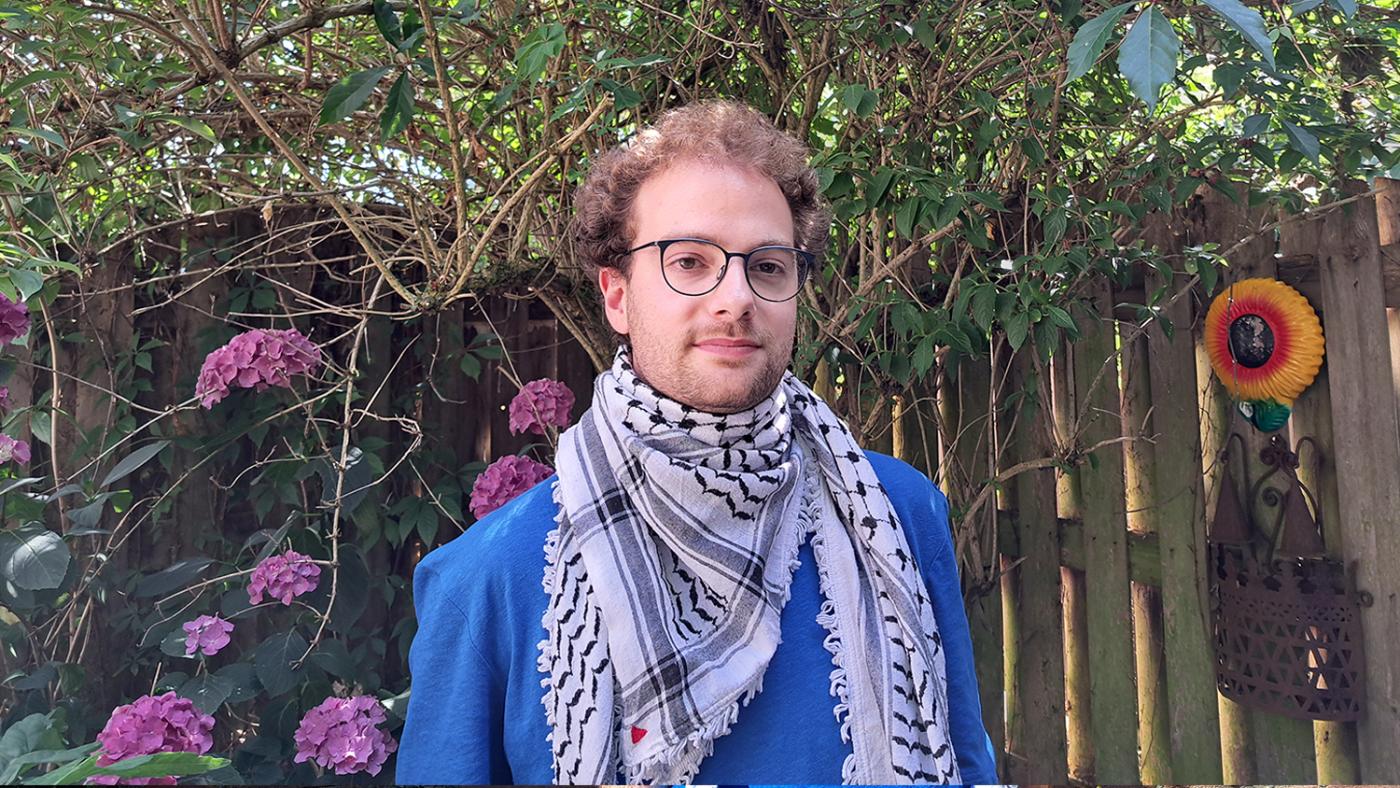
With his hands folded, student Itaï van de Wal stands opposite college president Anton Pijpers on the Drift. Itaï wears his Palestinian scarf, Pijpers holds a megaphone. It has been a typical scene over the past year. Itaï is one of the faces of Student Encampement, which wants Utrecht University to sever all ties with Israeli universities. To reinforce these demands, demonstrations are held, blockades are erected and university buildings are occupied.
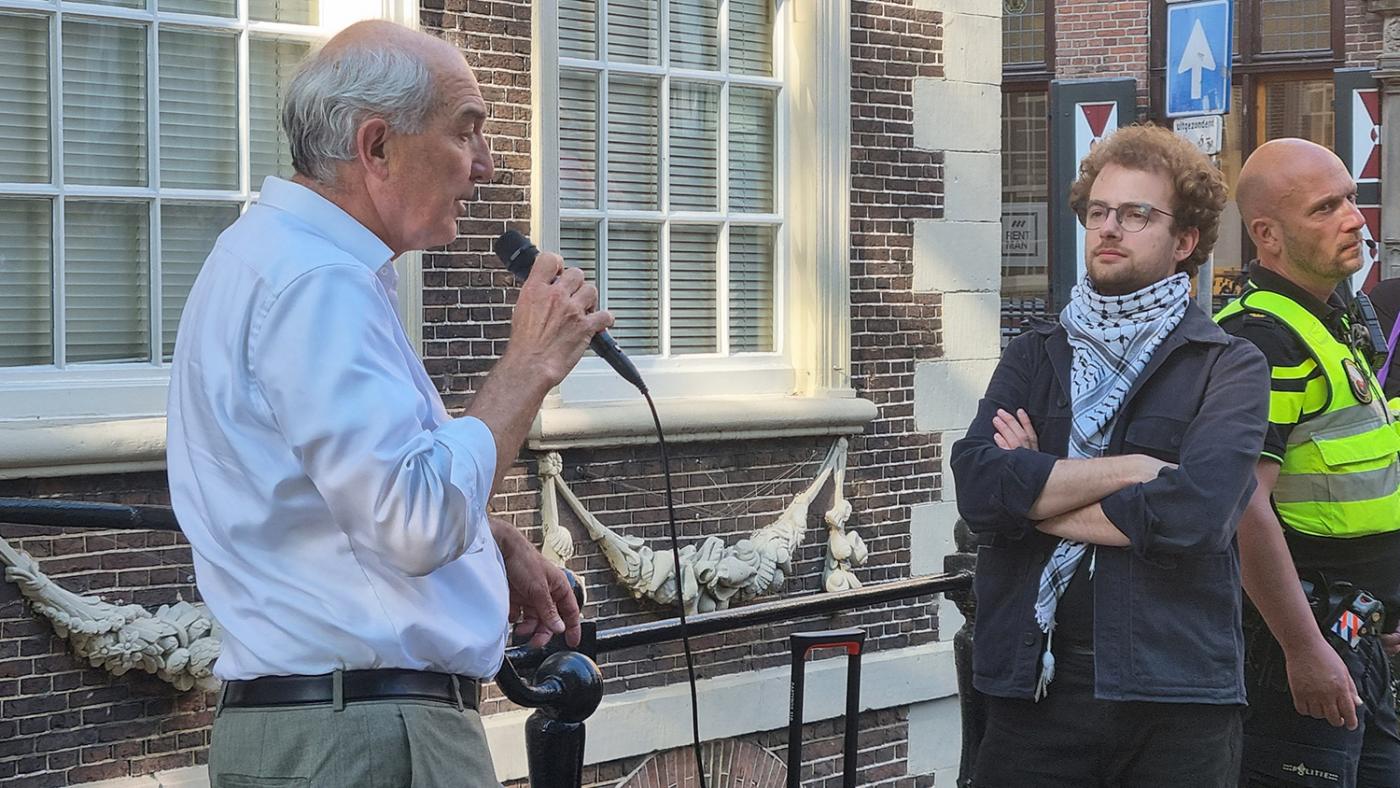
President Anton Pijpers and Itaï van de Wal, Photo DUB
Itaï is doing the master programme Legal Research in Utrecht and a bachelor's degree in Law at the same time. He previously studied Liberal Arts in Tilburg before coming to Utrecht in 2021. He had to miss part of the last occupation at Drift 25 because he was studying hard for an exam that happened to be on that day.
The Israeli occupation of Gaza and the oppression of the Palestinians have been on his mind for years. "I am of Jewish descent and grew up in Brabant. When I was young, we went to a synagogue with a small community, which I have fond memories of. In our family, there was always room for criticism of the Israeli government. At the same time, it was a sensitive issue. We had family in Israel, so we felt connected."
The way Israel treats Palestinians can only be described as apartheid
It was and is a complicated issue. He felt it was a subject that could not be ignored. His Liberal Arts programme, which he completed about five years ago, helped him become more critical. "During my studies, I learned how to read sources. I became increasingly interested in the history of Israel. It became clear to me that in 1948, the Palestinians were brutally expelled from the land where they lived. The way Israel treated this group can only be described as apartheid. Israel used the exclusive right of self-determination of the Jewish people in the area called Palestine as an argument. Jewish people from all over the world had the right to return. That gave them the right to expel and oppress the Palestinians. I found it disturbing that they said they were doing this on my behalf. That affected me the most."
The seed of resistance had been sown. A meeting at Tilburg University about the BDS movement, an organisation that advocates boycott, divestment and sanctions against Israel, marked a turning point. "I have always said that Jewish people in Israel should speak out against the policy of oppression. That's where I saw the hope for change in Israel. A Palestinian scientist said that evening: “There is no hope from that corner. That is not where change will come from.” He therefore advocated an academic boycott."
Where I can exert influence is at the university. That is where I study and where I have a say.
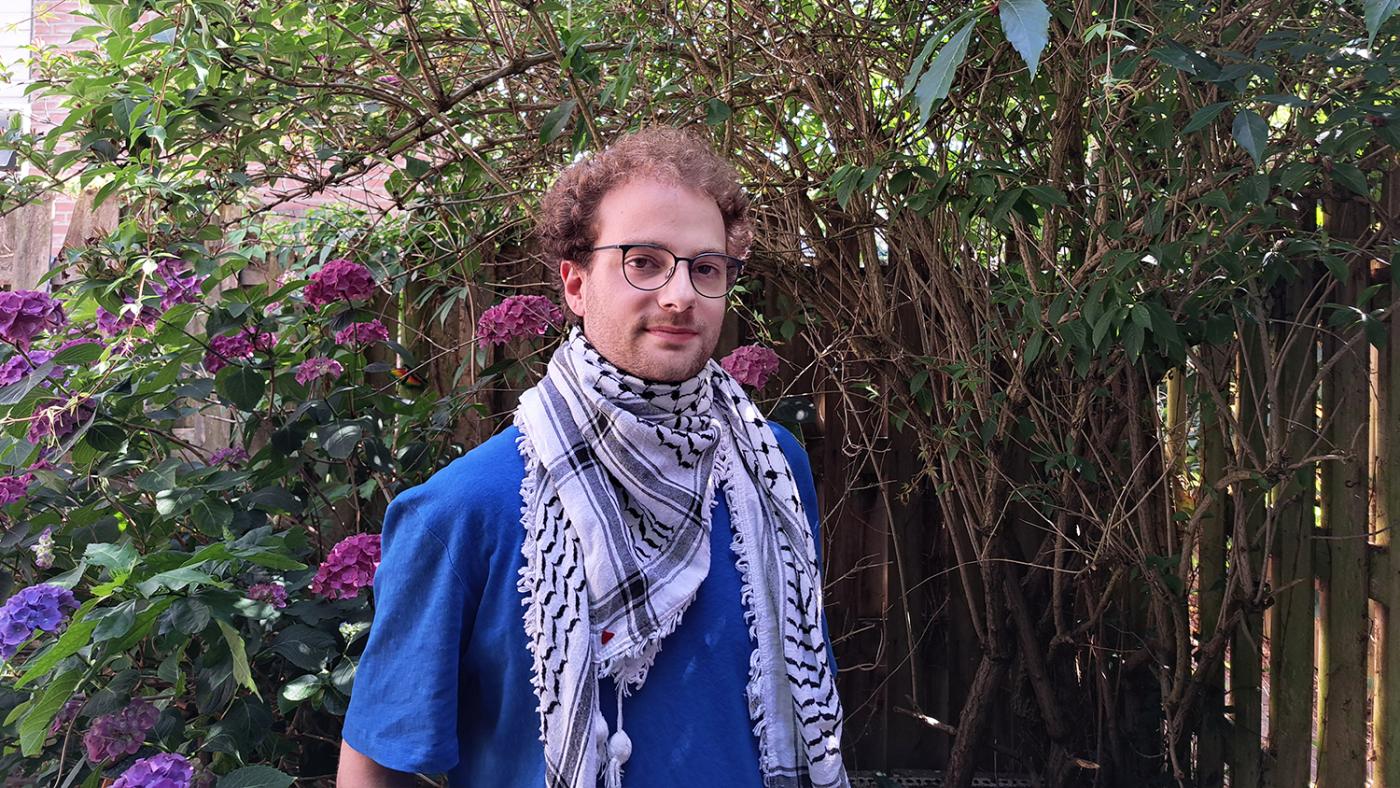
For Itaï, it became increasingly clear how apartheid works in Israel. ‘When I was visiting the country, I didn't see the apartheid, but you could feel it constantly. Palestinians were invisible in everyday life. Motorways in the occupied West Bank were only accessible to Jews. In the distance was a Palestinian village. That society is thoroughly segregated.’
In 2021, Israel bombed Gaza. "I had just moved to Utrecht. I saw that Gender Studies was publishing articles about it. He got in touch, and that led to an opinion piece on DUB that year, together with lecturer Layal Ftouni, in which he argued for an academic boycott of Israel.
‘I thought, what can I do to put pressure on Israel? Protesting to the Israeli government is pointless. The Dutch government has had a pro-Israel policy for years. Where I can exert influence is at the university. That's where I study and where I have a say. Israel is a knowledge economy, and by putting pressure on an academic boycott, you directly affect the interests of the state.’
Itaï was already politically active. At the age of 18, he was on the GroenLinks candidate list in Breda. The party won five seats. As number seven on the list, he was allowed to participate in the parliamentary party and attend committee meetings. ‘That's where I learned how politics works. I found it extremely educational, but I also discovered that it wasn't for me. Most decisions were made during the drinks reception.’
For me, 7 October wasn't the starting point, but it did make it all more urgent
A few years ago, Itaï resigned from GroenLinks. ‘I was already living in Utrecht at the time. At that time, far-right parties were on the rise. Groups were walking around the Maliebaan carrying Dutch flags. It was logical that young anti-fascists would protest. I joined them. But GroenLinks was afraid of that group. They withdrew from the demonstration. I didn't think that was appropriate for a political party I was a member of.’
So he became increasingly involved in resistance. In addition to his studies, he started working at the European Legal Support Centre for a few years. There he provided legal advice to activists. What are your rights as a demonstrator? What should you do if you are arrested and, more importantly, what should you not do? In his case, he supported many pro-Palestinian activists.
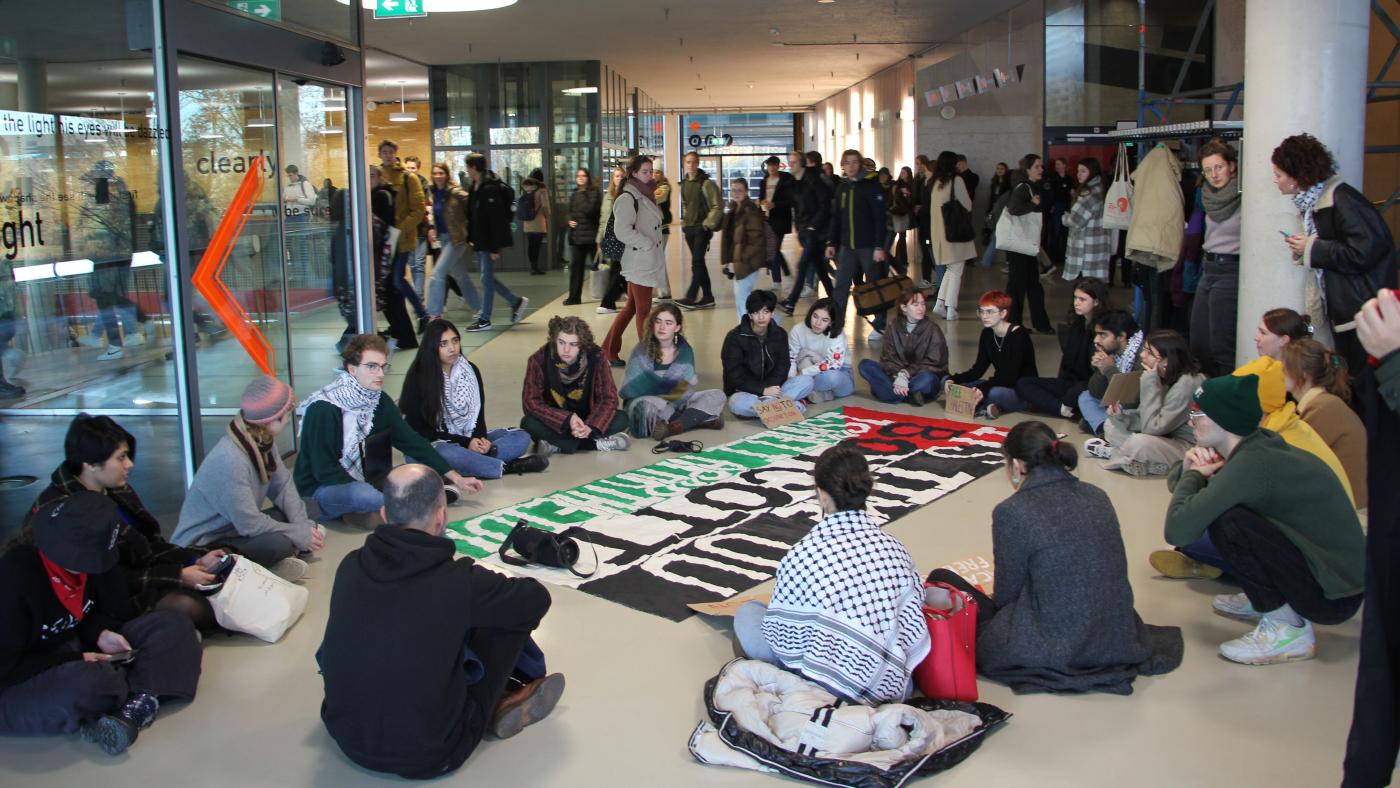
Teach-in at Educatorium in 2022, Photo DUB
He himself became active in Utrecht Students for Palestine in 2022 and, from 2024, in Utrecht Encampement, a group of students in Utrecht campaigning for an academic boycott. The movement arose after 7 October, the day Hamas killed many Israelis and took 255 hostages. Shortly afterwards, Israel began its retaliatory attacks on Gaza. ‘For me, 7 October was not the starting point. But it did make it all more urgent. Shortly after 7 October, Israel responded by cutting off electricity and water supplies to the Gaza Strip. In my view, that can already be called genocidal violence. You know that people will die.’
In many of their stories, it was clear that resistance was the only thing left to them as human beings
Regardless of Israel's response, Hamas's actions are also seen as an act of violence that claimed innocent victims. Itaï: "I see Hamas's actions as an ultimate act of resistance.
When I think of 7 October, I think of a visit I made to the Jewish Historical Institute in Warsaw. There you can read the testimonies of people who were in the ghetto during the Second World War, trapped like rats. It's incredibly moving. These Jewish people lived in despair. In many of their stories, it was clear that resistance was the only thing they had left as human beings. The fundamental right to resist, in whatever way possible. That has stayed with me and I think it also applies to the Palestinian people."
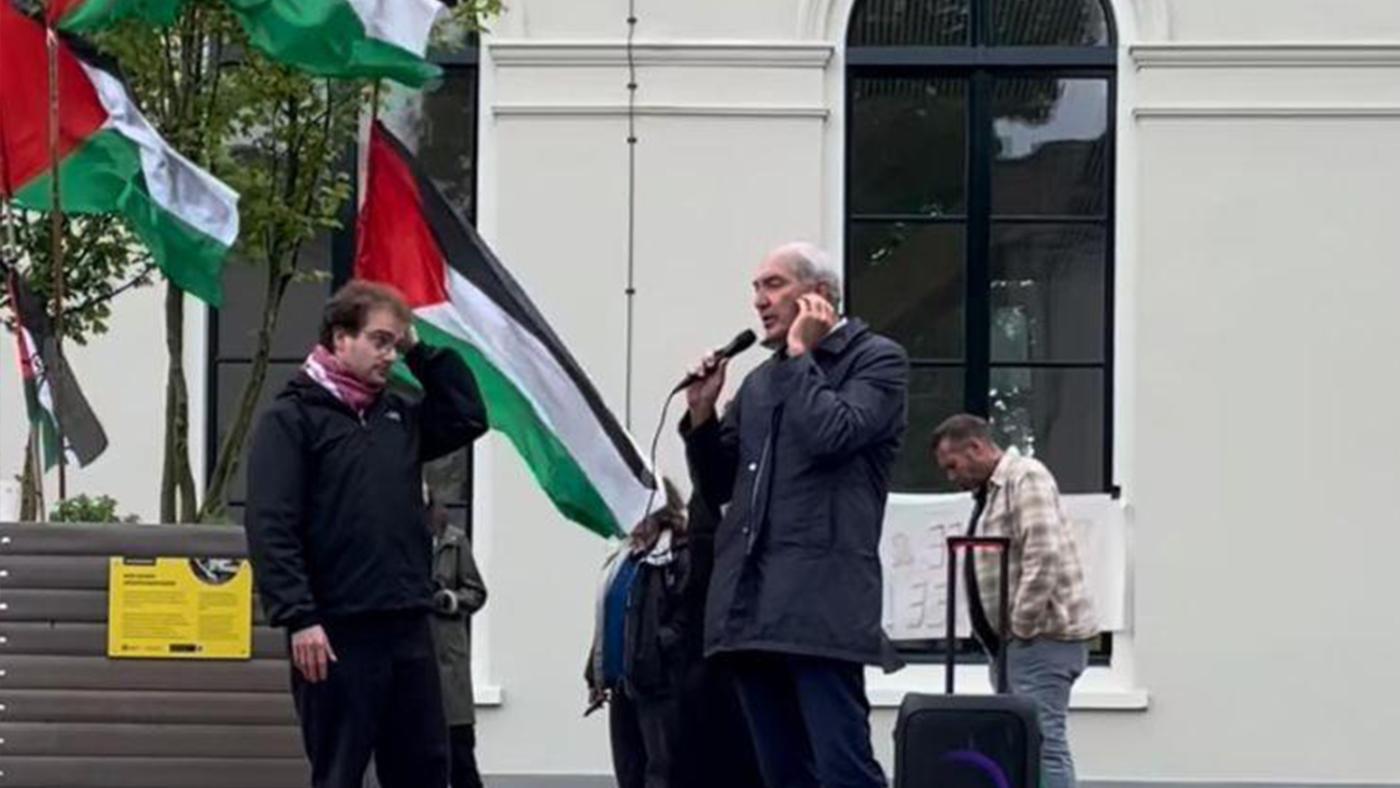
Debate Anton Pijpers with pro-Palestina activists. Itaï is moderator. Photo DUB
Over the past two years, the Palestine protests at the university have increased and become more intense. In the spring of 2024, there were several occupations and evictions. This spring, the struggle continued. The activists stayed in the courtyard of the University Library for two weeks. There were three occupations during which students were allowed to stay overnight at Janskerkhof and on the Drift. The riot police were called in once.
Contact between activists and the university board has been difficult from the start. The board insists on dialogue and says that the activists are not open to it. Former rector Henk Kummeling talks about reading statements without the possibility of a conversation. Itaï says that he mainly experienced the board's attempts to engage in dialogue as feints. "Actually, they didn't want to budge, at least in the initial phase. They insisted on a meeting with a delegation, which was very frustrating. Afterwards, you had to explain to the others that the board was not willing to meet our demands. Our impression was that we couldn't really discuss our demands."
The board has a duty to be accountable. They must listen to the demands and then explain their choices in a reasoned manner
Last summer, a university dialogue was organised. Itaï was supposed to attend as a representative of Student Encampement. He arrived, read a statement and left, to the indignation of those who remained. Why didn't he take the time to respond to the other participants? Surely he could have made his point there? "Initially, we were going to organise the dialogue together. We wanted it to be open to the public in a neutral location, such as Tivoli. But that wasn't possible. It had to be at a secret location and the public could only attend via a live stream. They were afraid for their safety. I felt it was a mockery. That's why I left. Look, the board has a duty to be accountable. They have to listen to the demands and then explain their choices in a reasoned manner. It is essential that this happens in public, as a form of accountability to their own students and staff. We did not see that willingness."
Anton Pijpers turns up at every occupation, and UU staff seek contact to make agreements. In the autumn, vice-chair Margot van der Starre also spoke with the occupiers outside the building during an occupation of Drift 13. This spring, there was a public discussion in the University Library courtyard with Anton Pijpers. Itaï was the moderator in both cases. ‘Those conversations were better because you're talking to a group as a board. I notice that they think more about what they say in a public debate. During that conversation in the courtyard, Pijpers announced that the UU would amend the statement.’
When you're sleeping on a mat in a building like that and security can come in at any moment, you feel very vulnerable
But in general, Itaï thinks it's rare to get the board to agree to their demands for a total boycott of Israeli universities. ‘So far, the discussions have mostly been about the occupation, when we would leave and what demands the UU said we had to meet.’
Recently, the activists were allowed to stay overnight twice. Afterwards, the president of the board complained about the damage and vandalism. Itaï does not say much about this. But he does say that he thinks things would have gone better if the UU had been open to agreements. "We are well prepared to proceed with an occupation. We offer participants action training so that they know exactly what their rights are and how to behave when the riot police arrive. Internally, we make agreements about what we will and will not do as a group.
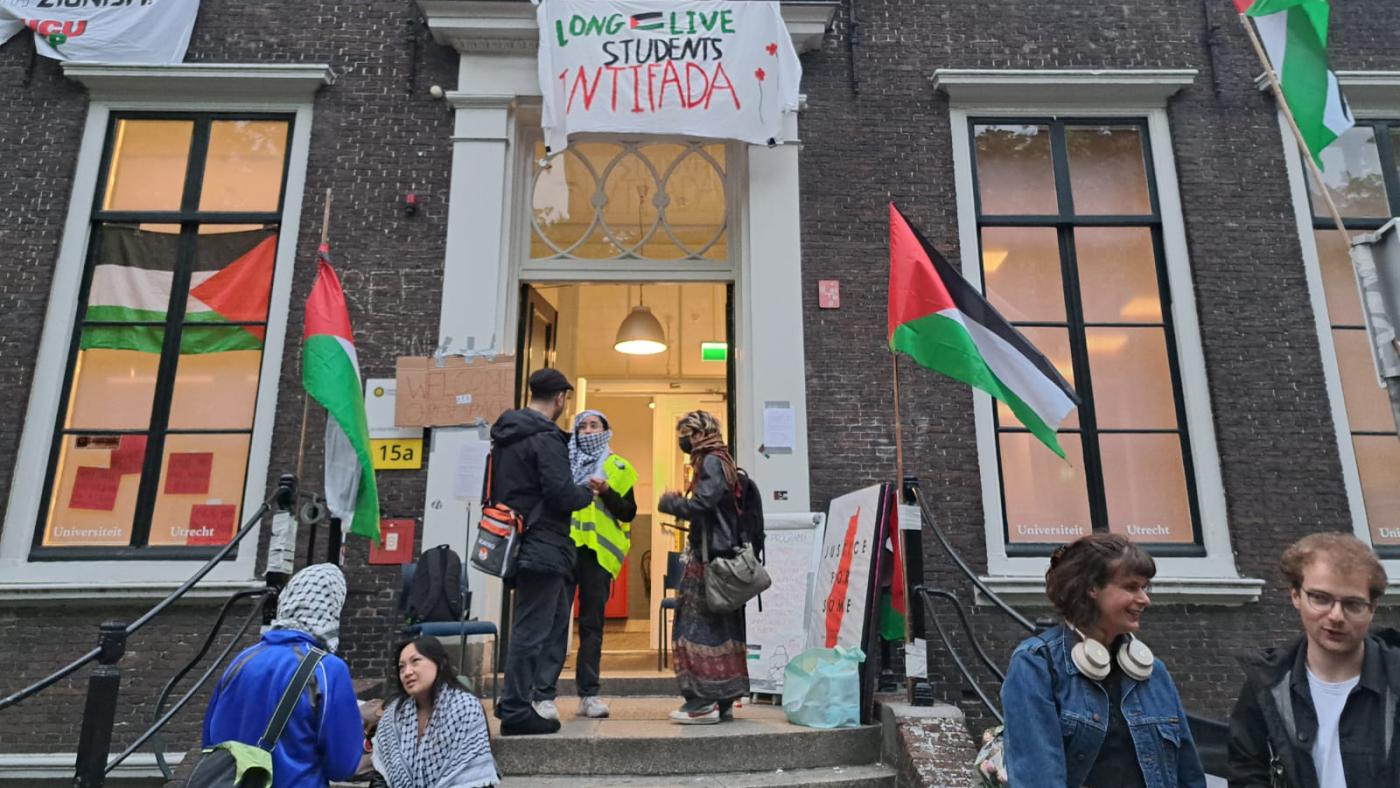
Occupation Janskerkhof. Photo DUB
"That's why we would also like to make agreements about spending the night. Currently, the agreements are bound by a number of strict rules that have been imposed. They want security to be able to enter at any time. We don't want that. The security guards work together with the police, and recently physical violence was used. When you're sleeping on a mat in a building like that and security can come in at any moment, you feel very vulnerable.
“At Janskerkhof, we had no contact with the university or the police. We didn't know if we would be evicted. I found that stressful. You feel responsible for everyone's safety. Vandalism could be prevented if we made workable agreements, which is not the same as having rules imposed on us. You don't need to build barricades if you know you won't be evicted.”
I know many Jewish UU students and staff who support our actions
In mid-May, Utrecht University tightened its statement on cooperation with Israel. No new partnerships and a project in collaboration with the Ministry of Health has been scrapped. The activists, but also UU staff, strongly criticised the amended statement, precisely because it became known at that time that Israel had launched another ground offensive and made humanitarian aid almost impossible. Two petitions were signed by more than a thousand UU staff members.
In a recent meeting, Rector Wilco Hazeleger said that the new statement had been misunderstood. ‘In fact, this is a temporary boycott. We no longer have any institutional contacts with Israeli universities.’ Only European cooperation through the Horizon programme will continue. However, a decision on whether to discontinue this must be taken at European level.
Itaï does not believe that the demands have been met. In his view, the UU should sever all ties and clearly speak out in favour of a total boycott, including that of Europe. Delft, for example, has done so. Moreover, ties should not be frozen, as is currently the case, but severed permanently, and the university should speak out clearly about Israel's genocide. ‘It is becoming clear to more and more people that Israel is committing genocide in Gaza and that we cannot accept this. Within the university, too, the group calling for measures is growing. And that has nothing to do with anti-Semitism. I know many Jewish UU members who support our actions.’